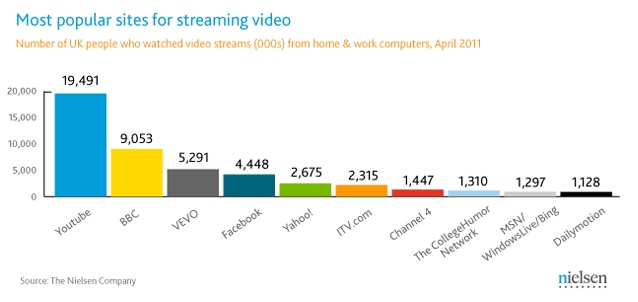The Future of Online Television
With millions of people watching television shows and films on the Internet every month, the popularity of streaming TV online has become old news; but recent trends indicate that our access to free online television may soon become more limited.
 British viewers have begun to rely on online catch-up services provided by television channels, such as the BBC, ITV, and Channel 4, to watch television shows after they have aired. For now these services are free (albeit with plenty of adverts), and we even avoid paying television licence fees for them; but the popularity of these services hasn’t gone unnoticed and many channels have begun to think of ways to cash in on our viewing.
British viewers have begun to rely on online catch-up services provided by television channels, such as the BBC, ITV, and Channel 4, to watch television shows after they have aired. For now these services are free (albeit with plenty of adverts), and we even avoid paying television licence fees for them; but the popularity of these services hasn’t gone unnoticed and many channels have begun to think of ways to cash in on our viewing.
ITV recently announced that starting in January 2012, it will begin charging fees to watch its most in-demand programmes. Although details have yet to be released, there has already been a backlash from viewers, much of which has taken place on Twitter.
But ITV isn’t alone. The BBC may also be toying with the idea, and has just launched an iPad app that would allow viewers to access its shows globally using a subscription. While there is no talk yet of instituting a fee system for its British online viewers, this app could be an indication of what is to come.
Our counterparts in the US are also seeing this change emerge as Fox television has recently announced plans to charge online viewers for watching episodes within a week of their original air dates. And the popular television streaming website Hulu launched a subscription plan last year, this time for older episodes of a show (the first five episodes are currently available free to viewers in the USA).
The trend for subscription streaming seems to be gaining momentum across the industry as more companies start to offer online videos at a cost. The retail giant Walmart has just launched a subscription-only service for television shows and movies on its website, much like services found on iTunes. Netflix, another television and movie provider, has recently increased its subscription rate in an effort to encourage more users to stream videos rather than have a DVD sent to them by mail.
While the majority of our television shows are still accessible for free, these recent changes may indicate a larger overall movement that will occur. Whether viewers will take kindly to paying for these services is another issue, however streaming television and movies has become so commonplace that not having the access at all may be a worse option.
Although the Internet is full of unofficial websites offering free television, the legality of their content is constantly under question and many of them are taken down quickly or offer poor quality content. Because of this, people still turn to official sources for their television viewing, and subscriptions to television channels online could have strong potential. Audiences have proven that they are willing to pay for other online media services, the perfect example being music, and that they are very willing to pay for television in other forms (cable bills, TV licence fees, and DVD purchases), so subscription charges wouldn’t be too much of a stretch.
Only time will tell whether we continue to get free television online. For now though, we’ll happily grab our laptops, make some popcorn, and find out what’s on the telly.



